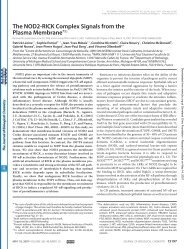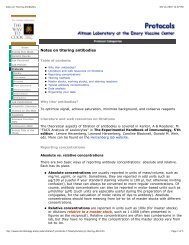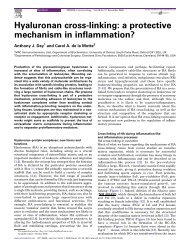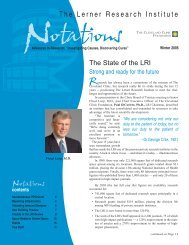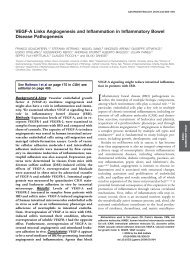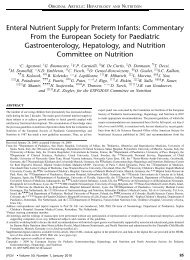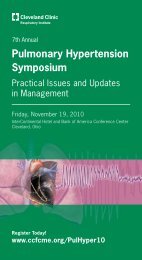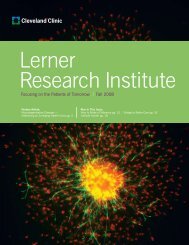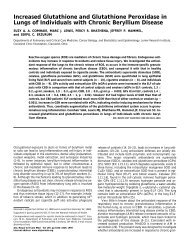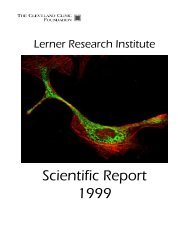Scientific Report 2003-2004 - Cleveland Clinic Lerner Research ...
Scientific Report 2003-2004 - Cleveland Clinic Lerner Research ...
Scientific Report 2003-2004 - Cleveland Clinic Lerner Research ...
- No tags were found...
You also want an ePaper? Increase the reach of your titles
YUMPU automatically turns print PDFs into web optimized ePapers that Google loves.
THE TRAPPLABORATORYINVESTIGATORSAnsi Chang, M.D.Ranjan Dutta, Ph.D.Susan FoellYasuhisa Fujii, Ph.D.Grahame Kidd, Ph.D.Jennifer McDonough, Ph.D.Micke MooneyKim Moran-Jones, Ph.D.Jackie Morris, Ph.D.Therese SvarovskySam TaylorJerome Wujek, Ph.D.Vijay Yadav, Ph.D.Xinghua Yin, M.D.GRADUATE STUDENTSKaren BaracskayJohn PetersonCOLLABORATORSLars Bö, M.D., Ph.D. 1Wendy Macklin, Ph.D. 2Albee Messing, V.M.D., Ph.D. 3Sverre Mörk, M.D. 4Richard Ransohoff, M.D. 5John Roder, Ph.D. 6Richard Rudick, M.D. 7Elizabeth Fisher, Ph.D. 81Dept. of Neurology, Univ. ofBergen, Bergen, Norway2Dept. of Neurosciences, CCF3Dept. of PathobiologicalSciences, U. of WisconsinSch. of Veterinary Med., WI4Dept. of Neuropathology,Univ. of Bergen, Bergen,Norway5Depts. of Neurology andNeurosciences, CCF6Mt. Sinai Hospital, <strong>Research</strong>Inst., Toronto, Ont., Canada7Div. of Clin. <strong>Research</strong>; Dept.of Neurosciences and MellenCtr., Dept. of Neurology, CCF8Dept. of Biomed. Eng., CCFTrapp, B.D., Peterson, J., Ransohoff, R.M., Rudick, R., Mörk, S., and L. Bö (1998) Axonaltransection in multiple sclerosis lesions. N. Engl. J. Med. 338:278-285.Yin, X., Kidd, G.J., Wrabetz, L., Feltri, M.L., Messing, A., and B.D. Trapp (2000) Schwann cell myelinationrequires timely and precise targeting of P 0protein. J. Cell Biol. 148:1009-1020.Peterson, J.W., Bö, L., Mörk, S., Chang, A., and B.D. Trapp (2001) Transected neurites, apoptoticneurons, and reduced inflammation in cortical multiple sclerosis lesions. Ann. Neurol. 50:389-400.Wujek, J.R., Bjartmar, C., Richer, E., Ransohoff, R.M., Yu, M., Tuohy, V.K., and B.D. Trapp(2002) Axon loss in the spinal cord determines permanent neurological disability in an animal modelof multiple sclerosis. J. Neuropath. Exp. Neurol. 61:23-32.Chang, A., Tourtellotte, W.W., Rudick, R., and B.D. Trapp (2002) Premyelinating oligodendrocytesin chronic lesions of multiple sclerosis. New Engl. J. Med. 346:165-173.Bjartmar, C., Wujek, J.R., and B.D. Trapp (<strong>2003</strong>) Axonal loss in the pathology of MS: Consequencesfor understanding the progressive phase of the disease. J. Neurol. Sci. 206:165-171.150Genetic Manipulation of Glial Developmentand Myelin Formation Helps ElucidatePathogenesis of Myelin DiseasesThe objective of our research effort is twofold.The first is to obtain a betterunderstanding of cellular and molecularevents involved in glial cell development andmyelin formation in the central and peripheralnervous systems. The second is to understandhow myelin, myelin-forming cells, and axons aredestroyed in autoimmune andinherited diseases of myelin.A common theme of theseresearch programs is thatnovel information about thenormal function of myelinformingcells and myelinaxoninteractions will help usunderstand the mechanismsinvolved in the pathogenesisof permanent neurologicaldisability in human disease.Cellular and MolecularBiology of MyelinationA major objective ofthese studies is to obtain abetter understanding ofcellular and molecular eventsthat regulate oligodendrocyteproduction and differentiationand CNS myelination.Current studies use a varietyof transgenic mice to studythe role of axons on the initial production andsurvival of oligodendrocyte progenitors andpremyelinating oligodendrocytes. We are alsoinvestigating whether remyelination in the adultCNS involves the production of new oligodendrocytesin a manner that resembles that indevelopment. We use zebrafish to study themolecular interactions, which regulate differentiationof myelin-forming cells and the maturationand survival of axons. Other studiesconcentrate on the developmental appearanceand location of glial and myelin proteins innormal development and set the stage for furtherelucidation of their function in gene knockout ortransgenic animals. We are currently investigatingphenotypes in mice that overexpress P 0protein inthe PNS or in the CNS and in mice thatoverexpress PDGFα.Pathogenesis of Neurological Deficits inMultiple SclerosisThe overall aim ofthese studies is todetermine the cause ofMS and to therapeuticallyprevent irreversibleneurological deficits in MSpatients. MS is aninflammatory demyelinatingdisease of the CNS.Historically, it has beenassumed that there wasrelative sparing of axonsfrom the pathologicalconsequences of inflammatorydemyelination.We have describedabundant axonal transectionin MS lesions. Moreimportantly, our dataindicate that axonaltransection begins atdisease onset and is lateraccompanied by degeneration of chronicallydemyelinated axons. We propose that irreversibleaxonal loss represents the underlying pathogenicprocess responsible for permanent neurologicaldeficits in MS patients and for the conversion ofrelapsing-remitting MS to secondary progressiveMS. The therapeutic correlate to this hypothesis isthe likelihood that anti-inflammatory andneuroprotective strategies should be applied earlyin the disease course and continued during periodsof apparent disease quiescence. Current studiesare investigating cellular and molecular mechanismsof myelin and oligodendrocyte destruction,the potential of oligodendrocyteprogenitor cells to repopulate MSlesions with oligodendrocytes,mechanisms responsible for axonalBruce D. Trapp, Ph.D.degeneration in MS, pathologyresulting from demyelination of thecerebral cortex, molecules andmolecular interactions that mediateentry of immune cells into MS lesions,and animal models of inflammatorydemyelination that include axonaltransection and neuronal pathology.Continuation of these studies shouldprovide direction for therapeuticintervention that may delay or stopprogression of MS.



